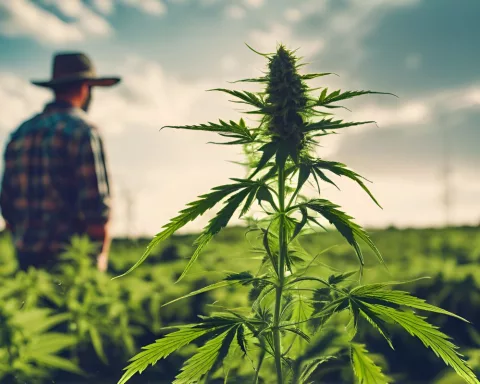The Western Cape has made a bold move by lifting strict rules on cannabis and hemp, opening the door for new jobs and economic growth. This exciting change, backed by the Can Plan, aims to make the region a leader in the global market for these plants. With this new approach, local farmers and businesses can thrive, creating a brighter future and promoting sustainable practices. The shift is not only about the economy; it also encourages a cultural change, helping people see the benefits of cannabis and hemp in a new light.
What is the significance of the Western Cape’s new cannabis and hemp regulations?
The Western Cape’s recent removal of restrictive cannabis and hemp regulations is significant as it fosters industry growth, job creation, and economic stimulation. This change, supported by the Can Plan, paves the way for sustainable practices and innovation, positioning the region as a leader in the global market.
A Landmark Decision
In a momentous decision that has generated significant excitement across multiple sectors, the Western Cape Government has warmly welcomed the recent removal of controversial regulations by Health Minister Dr. Aaron Motsoaledi. These rules had previously banned the sale, importation, and production of food products containing hemp and cannabis, effectively stymieing the growth of an emerging industry. Cape {town} Etc. reports that this crucial policy change has sparked a wave of enthusiasm among business leaders, health experts, and a broad array of stakeholders who recognize the vast potential within the expanding hemp and cannabis sectors.
Minister of Agriculture, Economic Development, and Tourism, Dr. Ivan Meyer, praised the move as a crucial step toward inclusive dialogue and thorough public consultation. “This will allow for comprehensive public consultation, ensuring that all voices, including those of business and health experts, are heard,” Meyer stated. His comments emphasize a commitment to developing well-rounded policies that will enable the industry to create jobs, enhance public health, and stimulate economic growth.
The Can Plan: A Roadmap for the Future
This announcement follows the Western Cape Department of Agriculture’s introduction of the Western Cape Cannabis Framework and Implementation Plan, or Can Plan, launched in March 2023. The Can Plan offers an in-depth roadmap and insights into the future of cannabis and hemp production, processing, and export within the agricultural sector. Meyer’s vision reflects a detailed understanding of the multifaceted value chain associated with the cannabis and hemp industry.
“One of the Government of National Unity (GNU) objectives is inclusive growth. We must protect jobs and support the value chain,” Meyer explained. During this consultation period, he urges stakeholders to consider the entire value chain, from research and biotech to logistics, IT, and brand-building. This comprehensive approach aims to maximize the contributions of the cannabis and hemp sectors to the Western Cape’s economic, social, and environmental objectives.
The lifting of restrictive regulations has not only safeguarded current jobs but also holds promise for creating new opportunities within this dynamic market. Supporters of the hemp and cannabis industry are optimistic about the potential for job growth and market expansion following this regulatory change. This optimism mirrors historical instances where easing regulations in emerging industries often led to economic booms.
Historical Context and Modern Potential
The history of hemp cultivation dates back centuries, with the plant playing a crucial role in various civilizations. For instance, during the Age of Sail, hemp was essential for producing ropes and sails, vital for maritime exploration and trade. Fast forward to the 20th century, the criminalization of cannabis and hemp in many parts of the world, including South Africa, hindered the industry’s growth. However, recent years have seen a global shift towards recognizing the medicinal, economic, and environmental benefits of these plants.
In the Western Cape, the Can Plan represents a forward-thinking approach to integrating cannabis and hemp into the broader economic framework. This initiative extends beyond mere cultivation to include processing, exporting, and even technological advancements necessary for a thriving industry. The plan acknowledges the importance of cutting-edge research and development, positioning the Western Cape as a potential leader in cannabis and hemp biotechnology.
Moreover, the emphasis on infrastructure and logistics within the Can Plan highlights the necessity of a well-functioning supply chain to support this burgeoning industry. It envisions a scenario where local farmers, processors, and exporters can seamlessly operate within a robust framework, bolstered by state-of-the-art facilities and efficient logistics networks. This comprehensive approach ensures that the industry can sustain itself and thrive in a competitive global market.
Job Creation and Environmental Benefits
The potential for job creation within this sector is immense. As the industry expands, it will likely require a diverse workforce, spanning agricultural workers, biotechnologists, logistics experts, and marketing professionals. This job growth could significantly reduce unemployment rates in the region, providing stable livelihoods for many families.
From an environmental perspective, hemp offers numerous benefits. It is known for its ability to grow rapidly with minimal water and pesticides, making it an eco-friendly alternative to more resource-intensive crops. Additionally, hemp can be used in various environmental applications, including soil remediation and carbon sequestration. By integrating hemp into the agricultural landscape, the Western Cape can make significant strides toward sustainability goals.
Health experts have also highlighted the potential medicinal benefits of cannabis, which could revolutionize public health approaches in the region. Cannabis-based treatments have shown promise in managing chronic pain, epilepsy, and certain mental health conditions. With proper regulation and research, the Western Cape could become a hub for developing new, innovative treatments that improve the quality of life for many individuals.
Cultural Shift and Economic Leadership
Supporters believe this industry could spark a cultural shift, leading to greater acceptance and understanding of cannabis and hemp. Historically, stigmas surrounding these plants have hindered their acceptance and growth. However, as more people become aware of their benefits, these perceptions are likely to evolve, fostering a more inclusive and progressive society.
This regulatory change also positions the Western Cape as a potential leader in the global cannabis and hemp markets. With the Can Plan as a guiding framework, the region can attract international investors seeking to capitalize on the burgeoning industry. This influx of investment could further stimulate economic growth, providing the necessary capital to build infrastructure, fund research, and support local businesses.
In conclusion, the removal of restrictive regulations marks a significant turning point for the Western Cape’s cannabis and hemp industry. With a comprehensive framework like the Can Plan in place, the region is well-positioned to harness the full potential of this dynamic market. By embracing a holistic approach that includes public consultation, research and development, and robust infrastructure, the Western Cape can achieve its economic, social, and environmental objectives while fostering a thriving cannabis and hemp industry.
“`markdown
What prompted the Western Cape to lift restrictions on cannabis and hemp?
The Western Cape lifted restrictions on cannabis and hemp following a momentous decision by Health Minister Dr. Aaron Motsoaledi, which has been welcomed as a crucial step for fostering industry growth, job creation, and economic stimulation. This change is part of a broader initiative known as the Can Plan, which aims to position the region as a leader in the global market for these plants.
How will the new regulations impact local farmers and businesses?
The new regulations are expected to significantly benefit local farmers and businesses by opening up opportunities for growth within the cannabis and hemp sectors. This shift allows for the production, processing, and sale of cannabis and hemp products, ultimately creating new jobs and enhancing economic prospects for the community.
What is the Can Plan and its role in the cannabis and hemp industry?
The Can Plan, launched by the Western Cape Department of Agriculture, serves as a comprehensive framework that outlines the future of cannabis and hemp production, processing, and exportation. It emphasizes sustainable practices and aims to support the entire value chain of the industry, from research and biotechnology to logistics and brand-building.
What job opportunities could arise from this industry growth?
As the cannabis and hemp industries expand, there will be a demand for a diverse workforce, including agricultural workers, biotechnologists, logistics experts, and marketing professionals. This growth could significantly reduce unemployment rates in the region and provide stable livelihoods for many families.
What environmental benefits does hemp offer?
Hemp is known for its eco-friendly attributes, as it grows rapidly with minimal water and pesticides. It can also aid in soil remediation and carbon sequestration, making it a sustainable alternative to more resource-intensive crops. By integrating hemp into the agricultural landscape, the Western Cape can move closer to achieving its sustainability goals.
How might cultural perceptions of cannabis and hemp change?
With the lifting of restrictions and increased awareness of the benefits of cannabis and hemp, there is potential for a cultural shift towards greater acceptance. Historically, stigmas have hindered the growth of these plants, but as public understanding improves, perceptions are likely to evolve, fostering a more inclusive and progressive society.
“`












